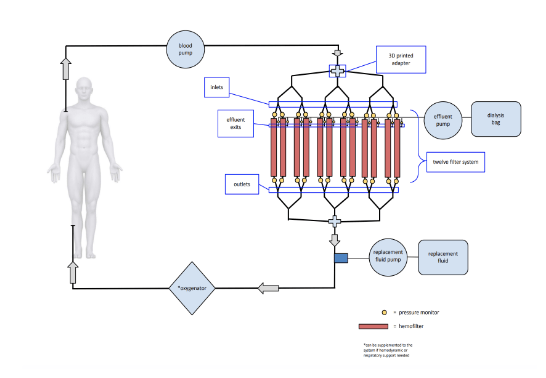Project Description:
Acute and severe poisoning poses a grave risk, potentially culminating in life-threatening scenarios or fatal outcomes attributable to cardiovascular complications such as dysfunction, arrhythmias, or cardiogenic shock. As a major public health problem worldwide, the World Health Organization (WHO) estimates 300,000 people die every year due to various poisoning agents. These toxic agents encompass a spectrum ranging from medications and addictive substances to household chemicals, industrial compounds, and toxins derived from plants, animals, or vegetables. Notably, the profile of poisonous substances varies across different regions globally; drugs possessing cardiotoxic properties dominate poisoning incidents in certain areas, while pesticides and household toxins prevail in others. In response to this pressing clinical challenge, our endeavor focused on elevating the performance of hemofiltration systems, leveraging the symbiotic relationship between hemofiltration and extracorporeal membrane oxygenation (ECMO). ECMO, renowned for its prowess in addressing heart and lung failure by swiftly circulating blood at rates of 4-5 L/min (physiological rate), was repurposed to extend hemodynamic support to critically ill patients grappling with toxic overdoses.
This project sought to design and execute the creation of an ECMO-compatible hemofiltration system that utilizes a twelve-hemofilter parallel arrangement made possible via the design and implementation of 3D printed components. By tuning the overall surface area and using the basis of a standard ECMO system, we intended to resolve the current limitations of the traditional system and surpass filtration rates of non-dialyzable toxins. Our team developed a system capable of stably supporting a range of flow rates upward of 5-6 L/min, alongside creating and implementing a blood-viscosity mimic that was run through the 12-filter hybrid system. The implications of this project regarding its potential clinical impact are notable and serve as a promise for an efficient solution towards modern medicine as a widely applicable modality to tackle the growing challenges of acute poisoning presentations. In the future, the ECMO-hemofiltration hybrid system could be utilized to remove various dialyzable and non-dialyzable toxins, such as metformin and flecainide acetate, beyond clinically relevant rates.
